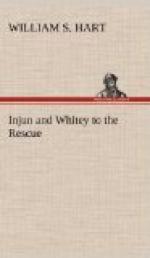There may have been reasons why the Indian children were kept from association with whites. But in the minds of these men of the plains, who knew both the bad and the good in the red men, and the bad and the good in the white men of that day and that country, the reasons were not founded on justice. Furthermore, they were conceived by lawmakers far away. So the cowboys vented their feelings against what seemed to them rank injustice.
“But t’ get back t’ what I know ’bout Injuns,” said Bill, after the discussion had gone on for some time. “What d’ye s’pose our Injun thinks ’bout this here rule as says he ain’t as good as that pie-faced Jim Adams? He knows ‘tain’t right, same as we do, an’ he thinks to himself, ‘Here’s another thing I got t’ put up with, an’ if I rare up an’ make a row ‘bout it, I’ll get th’ wuss of it, as my people always has. So what’ll I do? I’ll lay low, an’ say nothin’, an’ I won’t give them white brothers no chance t’ see that they’ve hurt my feelin’s. I’ll hide my hurt with my pride—one o’ th’ only things my white brothers has left me.’”
There was silence for a moment in the bunk house. Then Jim Walker spoke. “Well, Injun may think that,” he said. “But whatever he thinks you won’t never really know. He’s that savin’ o’ speech, like all Injuns.”
“They’re savin’ enough o’ speech here, ’mongst us folks,” Bill Jordan said. “But with their own people they’re great speech-makers.”
“G’wan,” objected Buck Higgins. “Who ever heard of a Injun talkin’ much.”
“Yes, siree,” Bill declared. “They’re great talkers ’mongst folks they knows and trusts. Why, at their pow-wows they’re reg’lar orators. Ev’body knows that what’s had a lot t’ do with ’em, same as me. John Big Moose was easy with white folks, an’ look the way he could spill langwidge. ’Most as good as we all.”
The others silently agreed to this, thinking what a great advantage it would be to John Big Moose in the Eastern college to talk as well as they did.
“Our Injun boy could talk as well as John Big Moose, if he was usin’ his own speech, an’ wanted to,” continued Bill. “He’s rather jerky now ‘count of his not knowin’ our langwidge very well, for one thing, an’ from bein’ in th’ habit of concealin’ his thoughts from white men—like all other Injuns—for another thing.”
Now you, who read this, must know by this time how well Bill Jordan liked to tell things and to prove them—if he could; and if he couldn’t make the other fellow believe they were true, to think up something the other fellow couldn’t answer; and if he couldn’t do that, to go away before the other could think of an answer. We all have known boys or men of this sort, and, being human, we don’t like to have them assuming that they know more than we do. That is, we don’t like it all the time. And this sort of feeling was stirring in that bunk house, at that moment. And finally Charlie Bassett spoke.




